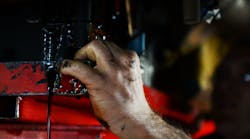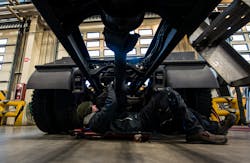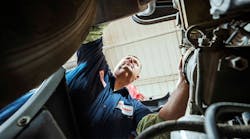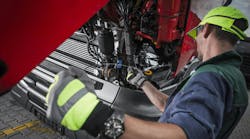The rigs of 2018 are a far cry from rigs 20 years ago. Fleet technology — from crash mitigation to improved fuel efficiency — has changed rapidly in recent years. And because of these enhancements, newer rigs have important needs that products such as fuel and lubricants must protect.
One category keeping up with fleet evolution is grease. Today’s grease is more technologically advanced than most people realize, and learning about these updates means you can make smarter and more efficient choices for your equipment.
“Grease isn’t just grease,” says Jon Woetzel , technical services manager for CHS. “It’s changed.”
A better base oil
Depending on a grease’s formulation, its base oil makes up 70% to 90% of its overall composition.
“The quality of the base oil is incredibly important,” says Woetzel. “It’s the majority of what goes into the grease.”
Greases are now being formulated with full-synthetic or synthetic-blend compositions. Synthetic oils are processed to have uniformly shaped molecules, which means they stand up better to heat and other kinds of wear and tear compared to conventional base oils.
“Synthetics tend to have better life expectancy,” says Woetzel.
Tougher thickeners
“You want grease to stay in place so it can do its job where it’s supposed to do its job,” says Woetzel.
The thickener, which makes up approximately 10% to 15% of the final product, is what makes this possible.
In older greases, oil loss or leakage was a common problem that meant grease didn’t always stay where it needed to be. Newer technology and components used for thickening stand up to a variety of conditions. Currently, approximately 50% of grease produced uses a lithium or lithium-complex thickener, which works well for high and low temperatures as well as for preventing water washout. The use of lithium-based greases has gone a long way to develop multi-grade and multipurpose products such as Blue Gard® 500+™, Maxtron FS and Red Protect XT that perform well under a variety of conditions.
Ready for extreme pressure
It’s not surprising that the heavy loads on the ball bearings of rigs is a top concern when considering a grease program.
“You’ve got to avoid metal-to-metal contact at all costs,” says Woetzel. “Any kind of direct contact leads to wear and tear, which eventually causes problems down the road.”
Updated grease technology can help mitigate this kind of wear and tear. “Many greases use a sulfur-phosphorus component,” says Woetzel. “CHS has switched to a calcium carbonate-based performance additive, which performs better in extreme pressure properties.”
Extra, extra protection
Another updated technology for fleet owners to consider is products with added protection. Grease formulations such as Maxtron® EP are created using molybdenum disulfide, known as moly. “The moly is actually a fine powder that’s considered a solid lubricant,” says Woetzel. “It lays down a protective barrier on the equipment components. It’s just one more layer of defense against metal-to-metal contact.”
Updating the technology used for your fleet means updating all the technology used for your fleet—including your grease. Finding products that use the latest innovations means your fleet will run more efficiently and avoid unnecessary wear and tear. No matter how you slice it, one thing remains true, says Woetzel: “Not all grease is created equal.”
For more insights and tips from Jon Woetzel, check out the Cenexperts® blog.




